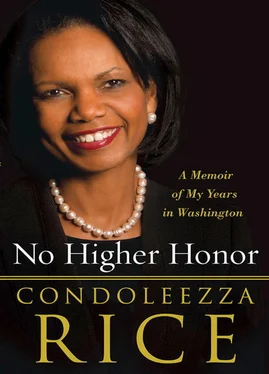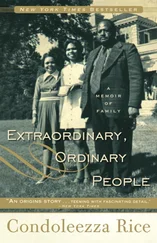The press conference was a disaster. The President gamely made his points about the importance of U.S.-Mexican relations, our respect for Mexican democracy, and his desire for partnership with Vicente Fox. No one was listening. “Why are you bombing Baghdad?” “Are you going to war?” “Did you tell President Fox that you were going to war?” I remember feeling sick from the afternoon heat, which was suddenly very pronounced. And I was so embarrassed by what was happening. The two presidents finished the press conference, and we said our good-byes.
The relationship between Fox and Bush never really reached its full potential. There were many reasons for that, including outsized Mexican expectations about immigration reform and our inability to deliver any change on this critical issue, despite the President’s deep desire to do so.
There were also disappointments on both sides after September 11, 2001, shifted our focus and required from Fox support of U.S. priorities that he could not give. Indeed, 9/11 occurred just days after the Mexican state visit later in the year, which had included an historic joint meeting between the two countries’ cabinets. The relationship with Mexico seemed destined to be overshadowed. Yet I have to think that that first encounter left its mark and contributed to the sense of lost opportunities that would follow.
That night we went to President Bush’s ranch in Crawford, Texas. We were all a little shell-shocked. The television stations were playing the “attack” over and over, and Saddam Hussein, who was a master of public relations, Middle East style, had trotted out as many bloody bodies and scenes from hospitals as he could muster. The strikes against the air defenses had taken place near Baghdad, but it was unlikely that they had resulted in the civilian casualties now chronicled on the news. The President said, “I’m going to call Dick,” perhaps seeking reassurance from an old foreign policy hand. The Vice President said that from his point of view it had been a good message, showing that we’d be tough on Saddam Hussein. I thought that it showed, once again, the United States’ arrogance toward our Mexican hosts.
The next morning I was astonished to see that the New York Times had taken the line that the Vice President had predicted. The air strikes had “sent a timely signal,” the paper said, that the new administration would “not shy away from using force to contain any new Iraqi military threat.” The Washington Post called the strikes “a welcome reinvigoration of an existing policy that had been allowed to slide.” I walked into breakfast with the President. “Mr. President,” I said, “I want you to know that I know the difference between lucky and good.”
We returned to Washington and conducted a postmortem on what had happened. A few days before departing for Mexico, the air force briefed Steve Hadley and me about an upcoming no-fly-zone mission. The general who briefed us did so in a very matter-of-fact way. Because it was our first experience with no-fly zones, we failed to ask a few key questions, such as “How routine is a mission of this type?” and “How close will it come to Baghdad?” The answers would have been “Not very routine” and “ Very close.” Even so, I doubt that the general would have said that we were likely to get into a “hot” fire exchange with weapons being fired. I blamed myself for not asking those questions. I should have known , I thought. How many times in my previous White House role had I seen the impact of unforeseen events involving military force? How many times had I taught about unintended consequences? That episode was an invaluable lesson.
The incident in Mexico was a reminder of the festering problem of Saddam Hussein’s Iraq and its threat to our interests. Almost from the very beginning Iraq was a preoccupation of the national security team. Our focus was not, as common wisdom now has it, on the overthrow of Saddam Hussein. Rather, the early efforts were aimed at trying to strengthen the containment regime that had been put into place after the Gulf War. That war had ended inconclusively with Iraqi forces expelled from Kuwait but the regime still in power. The assessment of the George H. W. Bush administration in 1991 that Saddam was so weakened that he would either fall from power or stay in his box turned out to be wrong.
The no-fly zones were just one part of a complex web of constraints that the international system relied upon to keep Saddam from attacking his neighbors and his people and prevent him from rebuilding his weapons of mass destruction (WMD). And those constraints were being undermined on multiple fronts. For example, the Chinese were building a fiber-optic system in and around the capital, making it harder to track Iraq’s military communications. Saddam was finding new ways to shield his forces.
At the end of the Gulf War in 1991, the international community had learned that Saddam’s WMD capabilities were far more advanced than expected. When inspectors had arrived after Saddam’s defeat, they had found that he was a little more than a year away from possessing a crude nuclear device. He had, of course, twice used chemical weapons, first against Iran and then against the Kurds, in both instances killing thousands of innocent civilians. The 1990s had been dominated by efforts to prevent him from restoring his capabilities. Resolution after resolution—sixteen in all—had demanded better access for weapons inspectors. But over the years, the inspection regime had been softened in myriad ways. Saddam wanted inspectors from the United States and Great Britain to be replaced by a mélange of nationals, some of whom had little experience in the WMD field. By the end of the 1990s, the Security Council would give in to his demands. The inspections themselves had at times lost the element of surprise when Saddam had insisted upon and gotten prior notification at designated sites. (Even when they could get in, inspectors often found themselves harassed by Saddam’s forces.) The international community was slowly slipping into a posture of “respect for Iraqi sovereignty.”
Over time, the Iraqis also became less and less compliant with even the scaled-back inspections, leading to multiplying questions about what was going on in Iraq. That ultimately led President Bill Clinton to order a military strike on suspected sites in December 1998. Just before the attack, inspectors left the country, not to return until 2002, and the Iraqi regime remained uncooperative.
Iraq had been, since 1991, under a comprehensive set of sanctions on prohibited items that could be used to rebuild military capabilities, including a prohibition against selling oil. That meant that there was no revenue to provide for basic goods such as food and medicine for the people. The effects on the population were growing increasingly harsh, with malnutrition rates exceeding 20 percent in the late 1990s. The Oil for Food program, which was created in 1996, permitted Iraq to sell a prescribed amount of oil. The money was then put into escrow, and food and medicines were purchased with that account. Compliance was the exception, however, not the rule. Saddam proved to be a master at developing front companies and shadow financing schemes to make illicit purchases. His bribery and cunning made the sanctions almost totally ineffective as he diverted funds to the priorities of the regime.
In an interview in early January, President Bush had talked about this situation and said that the sanctions against Saddam had become “Swiss cheese.” Thus our first NSC meeting reviewed the state of the sanctions regime and also examined the problem of how to make the no-fly zones more effective. I prepared a memorandum for the Principals Committee summarizing the situation in Iraq as unsustainable and proposing a plan of action. The approach was adopted that day.
Читать дальше












